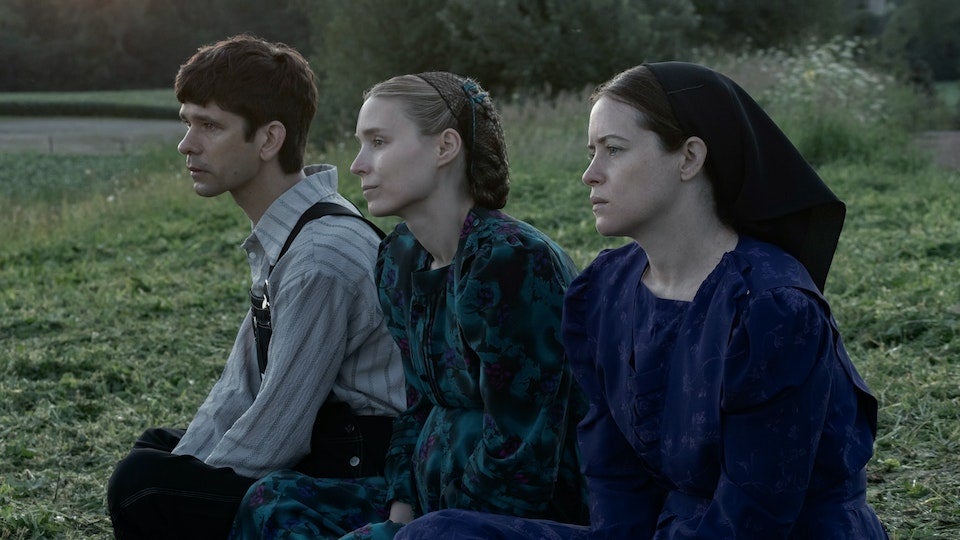
(spoiler free)
Based on Miriam Towers’ novel of the same name, Sarah Polley’s Women Talking tells the story of a group of women in an isolated Mennonite colony. The group meet to discuss what action they should take in response to the violence they have been, and are continually, subjected to by the men who they live with. Their options: leave their community, do nothing, or stay and fight.
Whilst not a true story, Towers’ novel is an imagined response to the horrifying real events of the Manitoba Colony in Bolivia between 2005-2009, where over a hundred women and girls were raped. The same is true of Polley’s film as its opening text describes it as “an act of female imagination,” rather than a true story. Although, regardless of the fictitious story Polley tells here, we all know that male violence against women is a universal truth. So despite this being an “imagination” the themes Polley explores here couldn’t be more relevant to the real-world experience of women everywhere.
Polley haș assembled an impressive ensemble to portray this group of women. Amongst her cast are well-known actors such as Rooney Mara, Jessie Buckley and Claire Foy; seasoned performers Judith Ivey, Sheila McCarthy and Frances McDormand; and a wealth of lesser-known actors, who prove more than capable of holding their own amidst this talented group, including relative newcomers Kate Hallett and Michelle McLeod. Ben Whishaw and August Winter also star as the few men who play an active part in the main events of the plot, but the former’s character involvement can feel misplaced and confused at times.
Conversely, the film is at its best when – as the title suggests – the women are simply talking. There’s power in their testimonies and the cast demonstrate this with the strength of their performances. Foy and Buckley’s characters are much more assertive than others and naturally attract the spotlight, with both actors channelling their appropriate fury with great potency. However, there’s also room for the more gentle-natured characters, such as Mara and McCarthy’s. Polley balances this abundance of characters well, creating a cinematic space where the wide range of voices and their opinions are all heard in a compelling way.
When considering the present Me Too era we live in, the themes of the film are of course timely. However, if this movement has taught us anything, it’s that violence against women from men in power has always existed. Therefore a film like this released at any point in cinematic history would be timely. The themes are explored well and remind audiences of just how much women have to sacrifice in their attempts to keep themselves, and in many cases their children, safe from male violence. In view of the religious context of the community, faith plays a key role in the characters’ discussions too. Polley doesn’t commit to taking a definitive stance against religion, but she does show how it can be a tool of powerful manipulation against the vulnerable.
It’s interesting then that with this lens, so far removed from modern secular society, and without the inclusion of some contextual details, Women Talking could easily be mistaken for an older period piece. And many will no doubt approach it with this such assumption, that is until the film corrects them. With it being set in the more contemporary 2010s, it does however make audiences ponder just how little the issue of male violence against women has improved over time. The juxtaposition of the colony’s less-developed way of life existing in the modern world can feel like a damning allegory for women’s lack of safety in today’s world.
With Women Talking being its most engaging during the discussions between the group, it’s a shame that these meetings don’t last slightly longer. Over the course of the film’s two day narrative they are interrupted for further scenes set around the colony. These aren’t bad, but they somewhat disrupt the flow and intensity of the conversations. The bolder choice might have been to devote the full runtime solely to the discussion, making it a more immersive single location drama. Nonetheless, the film largely uses its runtime well and doesn’t overstay its welcome. If anything, these pockets of space that divide the discussions show the strength of the conversation Polley has crafted.
But as a consequence of this Women Talking is never wholly gripping, instead only in parts. Yet the commanding performances of its cast elevate the film to moments of brilliance, which will have audiences hanging on the characters every word. This is only made possible thanks to the level of performance combined with the writing which ensure that the film’s subject is consistently tackled with honesty, urgency and thought. And for this reason alone, and with real life discussions on the same subject very much in mind too, it deserves to be engaged with.
Written by Hamish Calvert
★★★
Thanks for reading this review, if you enjoyed it and would like to support us you can buy us a coffee HERE and make sure to follow us @HCMovieReviews over on Twitter.
Thanks to Queen’s Film Theatre for screening access
Leave a comment